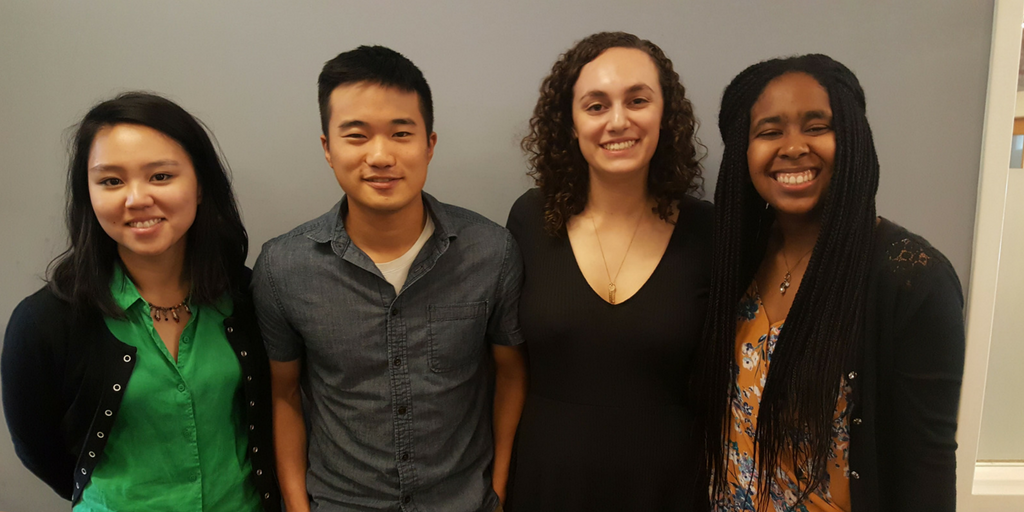Student Movements and Social Histories: A Summer with Story+
August 20, 2018
By Ellen Song, Ph.D. in English ’18

In the summer of 2018, I worked as a graduate mentor in the Story+ Summer Research Program, specifically in the Allen Building Takeover at 50 project that was sponsored by the Rubenstein Library. The end goal of the project was to curate a physical (and digital) exhibit to commemorate the 50th anniversary of the Allen Building Takeover, a student movement at Duke led by African American students in 1969, which served as an important catalyst for the creation of a black studies program on campus. This exhibit will be housed on the first floor of the Perkins Library – prime real estate on West Campus – in Spring 2019.
To say that my team members worked hard would be an understatement; these were some of the best Duke students I have ever had the pleasure of mentoring or teaching during my six years on campus.
In six weeks, my team of three undergraduates pored over and meticulously catalogued archival materials in Rubenstein Library, read monographs and primary sources pertaining to student movements in the 1960s and 70s, visited relevant exhibits in the wider Durham community, fully designed a layout for the physical exhibit and even created a website. To say that my team members worked hard would be an understatement; these were some of the best Duke students I have ever had the pleasure of mentoring or teaching during my six years on campus.

I applied to become a Story+ mentor for the most practical of reasons – as a source of summer funding, and perhaps as a way to gain “professional” experience in the realm of digital humanities – but I also suspected that it could be both fun and enriching. To be sure, participating in Story+ is to partake in a professional experience. I widened my professional network to include impressive members of Duke Libraries staff, the encouraging team at the Franklin Humanities Institute and my fellow graduate mentors, and I practiced the managerial/administrative skills that are admittedly not my strongest suit by sending numerous emails, coordinating trips and activities, delegating tasks and keeping track of expenses.
But I also learned, alongside my students, fascinating details about campus history and Durham history. I saw incredible archival documents that showed the full spectrum of campus responses toward the Allen Building Takeover, including very negative responses.

I was able to visit places I probably would not have visited without the push and financial support of a program like Story+, such as the International Civil Rights Center & Museum in Greensboro. Finally, and most importantly, I was reminded of two pleasures – the satisfaction of seeing intellectual work materialize in a finished and concrete form and the fulfillment of working alongside gifted, hardworking students.
Finally, and most importantly, I was reminded of two pleasures – the satisfaction of seeing intellectual work materialize in a finished and concrete form and the fulfillment of working alongside gifted, hardworking students.
For a Ph.D. student who was at the end of her graduate career and rather fatigued from a recent dissertation defense, Story+ provided me with just the right amount of responsibility, structure and interpersonal and professional relationships. There is only one thing that I would have done differently: I wish I had intentionally carved out time for more overtly academic lessons earlier on in the program. In other words, rather than diving straight into the practical and logistical work of our project, I wish I had also reviewed theoretical and abstract ideas with my students.
In essence, I wish I had done more straightforward teaching alongside all the “project management.” For example, I assigned readings in critical race theory on the last couple of days of the program, which my team found thought-provoking, if difficult. One student eventually e-mailed me later on to say that these last couple of days of theory led her to register for courses for the upcoming semester that she had not previously considered. As such, I wish we could have covered more.
In the end, I find that I keep coming back to the students.
In the end, I find that I keep coming back to the students. Story+ undergrads are a self-selected group of students who have chosen to spend a summer thinking critically and intensely about institutional histories and social issues. As a mentor, you will be able to interact with self-motivated and thoughtful students in a way that is less grueling than the typical teaching experience during a normal semester, but nonetheless real and valuable. Story+ projects can serve as a space to try out new teaching methods or bolster the techniques you’ve enjoyed using elsewhere. It can be a space to get to know some talented students a bit more personally – by, say, chatting about possible career paths over cupcakes, as I did. In any case, working as a Story+ mentor will prove to be a rewarding way to spend six weeks of the summer in Durham.
Learn More
- Check out the project outcomes of all ten 2018 Story+ research teams.
- Learn more about additional Bass Connections-affiliated summer programs, including Data+.
- Sixteen 2018-19 Bass Connections project teams are still recruiting students. Browse open teams and apply by August 23.
Photos courtesy of the Allen Building Takeover at 50 Story+ team: Ellen Song Ph.D. ’18, Alan Ko ’19, Alexandra Kadis ’20 and Zara Porter ’21
